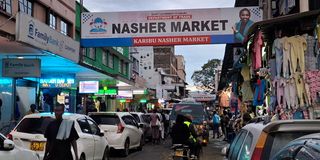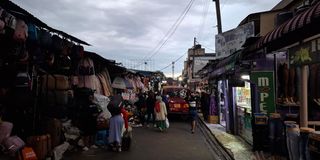Why women are avoiding the Mburu Gichua–Nasher market route

Entrance to Nasher market off Mburu Gichua Road on October 08, 2025.
There are streets in Nakuru that women have quietly learned to avoid. For Nakuru's girls one such place is the road off Mburu Gichua Road that leads to Nasher Market.
It's not because the road is unsafe due to muggings or violence. It's the subtle discomfort that begins the moment you step onto it: the heavy gazes, the constant catcalls and the endless cries of 'Madam!' or 'Mrembo!', uttered in a tone that feels more invasive than flattering.
Then there's the tugging, the brokers and traders who line the path below the Old Bus Stage and along the route towards Wakulima Market. They wave clothes in your face, grab your hand or block your way, insisting that you buy something. What should be an enjoyable walk through a market becomes a test of patience, self-control and personal boundaries.
As a woman who often uses that route, I’ve learned to wear what I call my 'sura ya kazi' that serious, no-nonsense expression that says 'don't mess with me'. It helps sometimes. Today, for instance, it shielded me from some of the harassment, though a few sellers still tried to lure me in with their 'latest fashion' wide-legged trousers and skinny jeans thrust in my direction like bait.
The sura ya kazi doesn’t come easily, though. It is often met with undertoned comments, snide remarks and laughter that follows you as you walk away.

Road off Mburu Gichua Road opposite Old Bus stage on October 07, 2025.
Last Friday, on my way back from Wakulima Market, I encountered a familiar scene: traders reaching out, grabbing my arm and blocking my path, even after I had declined their offers politely. I had to raise my voice and demand to be let go. Only then did they retreat, pretending it was all in good fun.
They call it business. But when the tone drips with entitlement and the gestures cross lines, it stops being about business. It becomes harassment the kind that doesn’t make headlines, but which slowly eats away at women’s freedom to move around, exist and breathe in public spaces.
Many women I know now choose longer, more inconvenient routes just to avoid that stretch of road. It's a small price to pay for dignity and peace of mind. Others only brave it when it is absolutely necessary, such as when they need to run errands or earn a living.
Most worrying of all is how normal this has become. To many bystanders, it looks like harmless banter 'just jokes', or 'men being men'. But for women, it’s yet another exhausting negotiation of safety, self-respect and survival.
In a fast-growing city with malls, markets and modern walkways springing up all the time, Nakuru’s women are still forced to navigate spaces where being seen feels like being hunted.
While everyone calls it 'just business', for us it's a reminder that public spaces in Nakuru and beyond are still not free for all.

